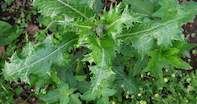
Herbs are fed to rabbits either fresh or dry, but dried herbs can cause problems unless it’s mixed into food. Where herbs are used as a medication and not as part of the days feed, it would only be given to the sick animal. Herbs can be grown in your garden or bought from a supplier.
Calendula
Used for burns, sores, antiseptic, bruises, slowly healing wounds, ulcers, skin diseases and digestive problems. Calendula - (Calendula officinalis).Chamomile
Pain relief, calm nervous rabbit. One of the best eye washes for weepy eye. Chamomile - (Matricaria recutita/ Chamomilla recutita).Comfrey
Use for healing, bone formation, ill bunnies, stressed and weak bunnies, respiratory expectorant. Comfrey - (Symphytum officinale).Use with care with dwarf rabbits as it also contains chemicals that can be dangerous as well as being medicinal.
Dandelion
While dandelion (Taraxacum officinale) is one of the world’s most common weeds, it is also one of the most astonishing healing plants. Use for blood purifying, respiratory ailments, anti-inflammatory, bladder infections, diarrhoea, milk flow of nursing does and it is a good treat for does after having a litter.Devils Claw
Devils Claw (Harpagophytum procumbens) is native to Africa. Use for arthritis, joint disorder, muscle stiffness and appetite loss.Echinacea
Echinacea (Echinacea purpurascens) immune system stimulant and broad-spectrum antibiotic. In the lower doses, it acts as a stimulant and in higher doses acts as an antibiotic. It is anti-inflammatory with anti-viral properties.Fennel
A good herb for digestion. Fennel (Foeniculum vulgare) treats bloating, gas and stimulates milk flow for nursing does.Hawthorn
Delicious and healthy treat, hawthorn (Crataegus oxyacantha) stimulates appetite and aids digestion. It is a source of numerous vitamins and minerals, contain a significant amount of bioflavonoids that enhance the absorption of vitamin C. One of the most valued and safest heart and vascular tonics.Lemon Balm/Melissa
Melissa (Melissa officinalis) is antibacterial, antiviral, bloating and gas, diarrhoea and reduces stress.Nasturtium
Easy to grow common flowers, nasturtium (Tropaeolum majus) has strongly antiseptic, antibiotic and antibacterial properties and is also used to treat intestinal parasites.Nettle
Nettle (Urtica dioica) is a common, ancient weed with profound healing properties. One of the richest sources of chlorophyll in the vegetable kingdom. Excellent forage being rich in iron, lime, sodium and chlorine. Nettle hay is particularly valuable to rabbits as food, especially for convalescent stock.It is a preventative against many contagious ailments, also a worm preventative. Increases milk yield. Also aids poor appetite.
As well as being high in protein and iron, nettles are said to be useful in cases of poor elimination such as eczema, rheumatism and arthritis. Nettles have an extremely high calcium level and a good Ca:P (Calcium to Phosphorus) ratio. Nettles are a good source of silica which can help keep the rabbit and guinea pigs fur and bones in good condition. Increases milk flow in nursing does.
Parsley
Very good tonic herb. Parsley (Petroselinum crispum) enriches the blood and treats urinary problems. Roots are used for constipation and obstruction of the intestines. Good for the cure of inflammation of bladder and kidneys, digestive disorders, fertility in bucks, and productivity in does.Plantain
(Plantago major – Greater plantain with flat rosette of leaves)(Plantago lanceolata – Ribwort plantain with spear-shaped and upright leaves)
Plantain is a common weed that is found throughout South Africa. Antimicrobial, antispasmodic, healing of cuts, respiratory expectorant, fevers. Great as a safe introduction of young kits to greens, works great for diarrhoea. Leaves soothe urinary tract infections and irritations. Good for gastric inflammations and regulates the functions of the intestines.
Rosehips
Rosehips (Rosa species) are a good natural source of vitamins A, C and bioflavonoids – a type of antioxidants. In addition to being a good source of dietary and crude fibres, rosehips also have a good calcium content and Ca:P (Calcium to Phosphorus) ratio.Rosemary
Rosemary (Rosmarinus officinalis) lowers blood pressure, ideal for exhaustion, weakness and depression in rabbits. The stems and leaves invigorate the circulation, stimulate the digestion and are good for cold conditions. Rosemary has very good fungicidal and insecticidal properties and is also used to parasitic worms.Thyme
Thyme (Thymus species) is virtually a universal valuable herb for both humans and animals due to its exceptional ‘anti-everything’ properties. It’s a superb herb with antibacterial, antiseptic, calmative, decongestant, digestive, expectorant, fungicidal, healing and tonic properties.The stems and leaves are useful as a digestive remedy, warming for stomach ache, chills and associated diarrhoea and also helps to expel worms.
Strawberry Leaves
The whole of the strawberry (Fragaria vesca) plant is antiseptic and cooling. Leaves are rich in iron. Externally used for inflamed areas, rashes and sore eyes. The leaves of the wild strawberry are exceptionally good at treating rabbits with soft and watery stools (diarrhoea) and inflammation of the liver.Yarrow
Yarrow (Achillea millefolium) is a valuable urinary antiseptic. It can be used externally to help heal wounds. Yarrow is often planted in permanent pastures for its medicinal properties and is a good rabbit food when young and tender. Treatment of all fevers. A famed wound herb to stop excess bleeding. Yarrow has a good level of calcium and a good to high Ca:P ratio.PLEASE NOTE THAT HERBS SHOULD BE USED WITH CAUTION AND NOT AS A REPLACEMENT FOR PROPER VETERINARY CARE. IF YOU SUSPECT THAT YOUR SMALL HERBIVORE MAY BE ILL, PLEASE CONTACT YOUR VETERINARIAN.
By Renate Jacobs